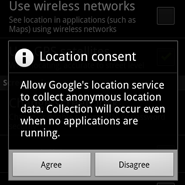
Android opt-in screen
Recent revelations about Google and Apple’s location-data collection activities on mobile are adding urgency to consumer and legislative privacy concerns.
In recent days, reports from several sources revealed that Android phones, iPads and iPhones are keeping precise track of users’ whereabouts. Apple devices are also storing location-based data about customers for a significant period of time and not storing it as securely as many would like.
“No one has really understood the extent of the data collection going on with these spy phones,” said John M. Simpson, Washington-based director of nonprofit Consumer Watchdog’s privacy project. “Last week, it started to become clear just how much was going on.”
These revelations give legislators something to focus on in ongoing privacy discussions.
“Prior discussions of location-based privacy have been abstract at times, as have do-not-track discussions,” said Jason Koslofsky, an attorney at Arent Fox LLP. “Now advocates for privacy can point to a concrete example of the concerns they have in the absence of stricter privacy controls.”
Location-based services threatened
As a result, there could be more legislative activity in the future around privacy issues as they relate to mobile devices.
More legislative activity is bad for location-based mobile marketing companies such as Groupon, eBay, Foursquare and every application that serves consumers content based on their GPS coordinates.
Over the weekend, Congressman Edward J. Markey (D-MA) expressed concerned over Google’s and Apple’s activities in a statement and asked for an investigation.
“Congress should immediately commence an investigation into this critical issue to help improve companies’ disclosure policies so consumers and families can understand who is seeing their information,” Mr. Markey wrote in the statement.
“I will continue to monitor this issue closely and I plan to introduce child online privacy protection legislation with a do not track requirement so that children do not have their online behavior tracked or their personal information collected or disclosed,” he said.
Intrusive? Or, more relevant?
While mobile companies point to the benefits location data offers consumers, such as being able to deliver geo-targeted search results, much of the concern centers on what could happen if this location-based data got into the wrong hands. This could cause consumers to start looking more closely at their mobile devices.
As tracking becomes a bigger part of the mobile market and it becomes more evident to consumers, problems could arise.
Mr. Simpson said there will be substantial push back from consumers who do not want this kind of intrusion.
Google points to the opt-in nature of this data in an official statement.
“All location sharing on Android is opt-in by the user,” the company said in a statement. “We provide users with notice and control over the collection, sharing and use of location in order to provide a better mobile experience on Android devices.
“Any location data that is sent back to Google location servers is anonymized and is not tied or traceable to a specific user,” it said.
While the situation does have the potential to hurt the images of Google and Apple, the real test will be in how they handle the current uproar over their data collecting habits.
Since both have been scrutinized in the past over data collection, experts believe they will handle this situation diligently.
“They are undoubtedly working diligently to address the issue from a technological and policy standpoint,” Mr. Koslofsky said. “Both companies have had privacy issues raised over time and most users probably understand that this data collection is necessary from a technological standpoint, so it’s unlikely to significantly damage the reputation of either.”

Tue, Apr 26, 2011 at 2:46 pm